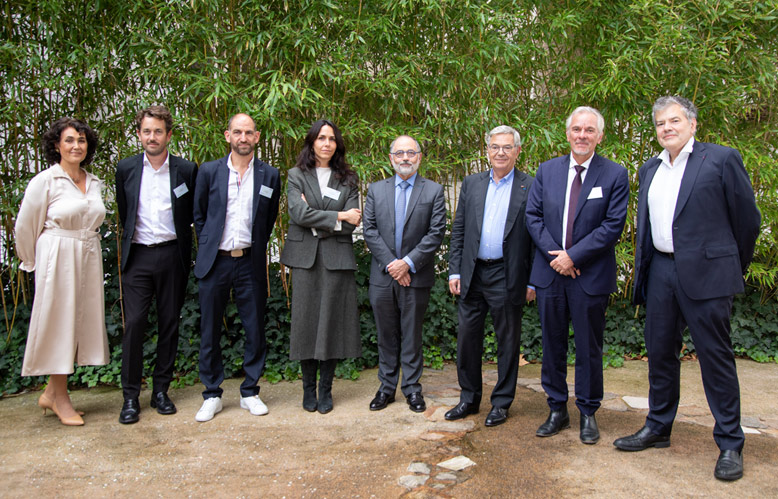Too many standards? Five organizations demonstrate the contrary

Voluntary standards make today’s markets and pave the way for tomorrow’s. A little-known economic power that the five winners of AFNOR’s Or Normes awards in 2023 have clearly understood and skilfully used, to gain a foothold in the nascent hydrogen market, launch a grassroots movement for responsible events, or reinforce the protection of minors online.
Let’s face it: the confusion between standardization and regulation persists, despite the fact that voluntary standards are designed by and for economic players, without the seal of government. AFNOR’s Gold Standards Awards hope to change the mindset of socio-economic players and opinion leaders by raising awareness of the role of voluntary standards in France’s international influence, when other countries have understood this better. The recent agreement signed with the Secrétariat Général pour l’Investissement (SGPI) also aims to achieve this. Here are the 2023 winners, rewarded on October 19 by the AFNOR members’ club in Paris:
Ecological transition category
Winner: French Atomic Energy and Alternative Energies Commission (CEA)
For over twenty years, the CEA has been a research player involved in standardization work on hydrogen technologies. In 2021, it was the 1st French research organization to file patents in Europe, but has always integrated standardization into its R&D process. This is the case for his research on hydrogen, which quickly led him to pilot pre-normative work such as the development of performance test protocols for fuel cells and electrolyzers, the transfer of knowledge on hydrogen diffusion in the wall of a storage tank to establish thresholds for use in regulations, and work on hydrogen’s carbon footprint. These now provide policy-makers with transparent, resilient tools for defining strategies to reduce carbon emissions. Standardization has helped to bring research results to market and to consolidate research and innovation programs.
Special prize: Organizing Committee for the Olympic and Paralympic Games
Paris 2024 is committed to organizing revolutionary, spectacular and sustainable games. Sustainability and legacy are at the heart of the ambitious Paris 2024 Olympic and Paralympic Games project. The OCOG is involved in the revision of the voluntary ISO 20121 standard, with the ambition of obtaining certification on the one hand, and the desire to develop the standard beyond its initial 2012 version, so that it reflects the best practices of the event industry on the other. Standardization has helped it to concentrate best practices in the events sector and make the industry more accountable.
Trusted and responsible digital category
Winner: Twelve App and its Yubo application
Yubo is behind the creation of a working group bringing together manufacturers, associations and institutions to draw up a best practice guide for platforms, focusing on three main themes: user assurance and trust, content detection and moderation, and education prevention. The aim is to create a toolbox of best practices, solutions and procedures to protect minors online, in addition to current and future regulatory measures, aimed at social networks and particularly new and small platforms. Standardization helped bring on board a very broad spectrum of players, from institutions to industry and associations.
Special prize: Union nationale des industries de la quincaillerie (UNIQ)
Until now, the properties of BIM hardware objects have been described in different ways, making them more complex to create and compare, for manufacturers and users alike. The Union nationale des industries de la quincaillerie (UNIQ) has mobilized its members, CETIM and UNM to create a common dictionary of properties for three product families, based on the NF EN ISO 23386 standard for construction information modeling and other digital processes used in construction. This work has been carried out in French and English, and has been submitted to the European standardization committee “BIM for building hardware”, which has approved its development, based on a standardized framework developed by UNIQ. The standardized property dictionary will enable European players to work on a similar basis. Standardization has helped UNIQ to build a common framework and a standardized language for this digital activity, which is still in its infancy in the sector.
Category: “A more inclusive, diverse society that contributes to well-being”.
Winner: Audilab
Audilab is a network of audioprosthetists involved in the development of a voluntary standard for the services offered by audioprosthetists, in order to improve the living conditions of their patients suffering from hearing disorders. This work was proposed at European level, leading to the publication of a European standard on hearing aid services in 2010, and was then taken to international level, in 2022, following the publication of ISO 21388. By establishing clear criteria and procedures, these standards help to harmonize practices internationally and improve the quality of hearing care for patients.